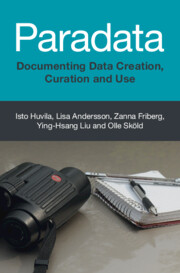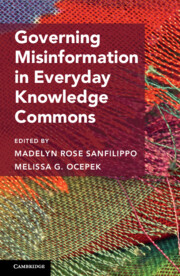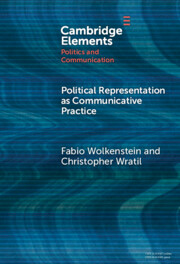7394 results in Media, mass communication
Copyright Reversion
- Reclaiming Lost Culture and Getting Creators Paid
- Coming soon
-
- Expected online publication date:
- August 2025
- Print publication:
- 30 September 2025
-
- Book
- Export citation

Paradata
- Documenting Data Creation, Curation and Use
- Coming soon
-
- Expected online publication date:
- July 2025
- Print publication:
- 31 July 2025
-
- Book
- Export citation
The Future of Press Freedom
- Democracy, Law, and the News in Changing Times
- Coming soon
-
- Expected online publication date:
- June 2025
- Print publication:
- 30 June 2025
-
- Book
- Export citation

Governing Misinformation in Everyday Knowledge Commons
- Coming soon
-
- Expected online publication date:
- March 2025
- Print publication:
- 20 March 2025
-
- Book
- Export citation
Figures
-
- Book:
- The Greatest of All Time
- Published online:
- 23 January 2025
- Print publication:
- 06 March 2025, pp ix-xii
-
- Chapter
- Export citation
Acknowledgments
-
- Book:
- The Greatest of All Time
- Published online:
- 23 January 2025
- Print publication:
- 06 March 2025, pp xiii-xvi
-
- Chapter
- Export citation
1 - The Economics of American Greatness
-
- Book:
- The Greatest of All Time
- Published online:
- 23 January 2025
- Print publication:
- 06 March 2025, pp 10-46
-
- Chapter
- Export citation
2 - The Problem of the Great All-Knowing Answer Man
-
- Book:
- The Greatest of All Time
- Published online:
- 23 January 2025
- Print publication:
- 06 March 2025, pp 47-80
-
- Chapter
- Export citation
Copyright page
-
- Book:
- The Greatest of All Time
- Published online:
- 23 January 2025
- Print publication:
- 06 March 2025, pp iv-iv
-
- Chapter
- Export citation
Dedication
-
- Book:
- The Greatest of All Time
- Published online:
- 23 January 2025
- Print publication:
- 06 March 2025, pp v-vi
-
- Chapter
- Export citation
Conclusion
-
- Book:
- The Greatest of All Time
- Published online:
- 23 January 2025
- Print publication:
- 06 March 2025, pp 197-218
-
- Chapter
- Export citation
Introduction
-
- Book:
- The Greatest of All Time
- Published online:
- 23 January 2025
- Print publication:
- 06 March 2025, pp 1-9
-
- Chapter
- Export citation
5 - The Great Counterculture Conundrum
-
- Book:
- The Greatest of All Time
- Published online:
- 23 January 2025
- Print publication:
- 06 March 2025, pp 160-196
-
- Chapter
- Export citation
3 - The Rise and Fall of the Great Changemakers
-
- Book:
- The Greatest of All Time
- Published online:
- 23 January 2025
- Print publication:
- 06 March 2025, pp 81-121
-
- Chapter
- Export citation
Contents
-
- Book:
- The Greatest of All Time
- Published online:
- 23 January 2025
- Print publication:
- 06 March 2025, pp vii-viii
-
- Chapter
- Export citation
Index
-
- Book:
- The Greatest of All Time
- Published online:
- 23 January 2025
- Print publication:
- 06 March 2025, pp 219-222
-
- Chapter
- Export citation
4 - How the Babe Became the Greatest (and the Roosevelts, Too)
-
- Book:
- The Greatest of All Time
- Published online:
- 23 January 2025
- Print publication:
- 06 March 2025, pp 122-159
-
- Chapter
- Export citation

Political Representation as Communicative Practice
-
- Published online:
- 24 February 2025
- Print publication:
- 27 March 2025
-
- Element
-
- You have access
- HTML
- Export citation
References
-
- Book:
- The House that Fox News Built?
- Published online:
- 06 February 2025
- Print publication:
- 13 February 2025, pp 213-224
-
- Chapter
- Export citation
4 - Did Fox News Influence How Members of Congress Voted on Legislation?
-
- Book:
- The House that Fox News Built?
- Published online:
- 06 February 2025
- Print publication:
- 13 February 2025, pp 67-83
-
- Chapter
- Export citation

